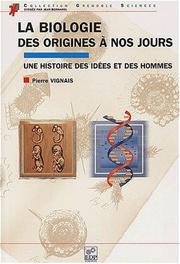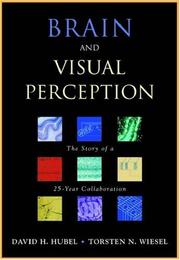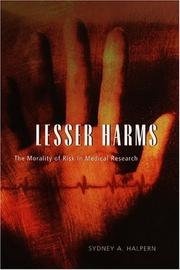| Listing 1 - 4 of 4 |
Sort by
|

ISBN: 2868835198 9782868835192 Year: 2001 Publisher: Les Ulis: EDP sciences,
Abstract | Keywords | Export | Availability | Bookmark
 Loading...
Loading...Choose an application
- Reference Manager
- EndNote
- RefWorks (Direct export to RefWorks)
Le livre introduit la biologie contemporaine par l’histoire de ses origines. Au travers des interrogations et des errements des pionniers de cette discipline, le lecteur appréhende la complexité des processus inhérents à la vie et acquiert une vision d’ensemble sur l’état actuel de nos connaissances. Ainsi l’auteur retrace-t-il les théories de l’évolution, les démarches qui ont conduit à la biologie cellulaire, à la biologie moléculaire et au déchiffrage du métabolisme cellulaire, en insistant sur les liens qui les unissent. L’ouvrage comprend de nombreuses illustrations, un index des auteurs et un glossaire pour faciliter la lecture de celui qui ne dispose pas de bases classiques de biologie.
Biologie --- Histoire --- Geschiedenis der geneeskunde --- Histoire de la médecine --- Biology --- History --- Biology- history --- Biomedical Research -history --- Bioethical Issues --- Biologie - Histoire

ISBN: 0195176189 9780195176186 Year: 2005 Publisher: New york: Oxford university press,
Abstract | Keywords | Export | Availability | Bookmark
 Loading...
Loading...Choose an application
- Reference Manager
- EndNote
- RefWorks (Direct export to RefWorks)
Outside back cover : "Scientists' understanding of two central problems in neuroscience, psychology, and philosophy has been greatly influenced by the work of David Hubel and Torsten Wiesel : What is it to see? This relates to the machinery that underlies visual perception, How do we acquire the brain's mechanisms for vision? This is the nature-nurture question as to whether the nerve connections responsible for vision are innate or whether they develop through experience in the early life of an animal or human. This is a book about the collaboration between Hubel and Wiesel, which began in 1958, lasted until about 1982, and led to a Nobel Prize in 1981. It opens with short autobiographies of both men, describes the state of the field when they started, and tells about the beginnings of their collaboration. It emphasizes the importance of various mentors in their lives, especially Stephen W. Kuffler, who opened up the field by studying the cat retina in 1950, and founded the department of neurobiology at Harvard Medical School, where most of their work was done. The main part of the book consists of Hubel and Wiesel's most important publications. Each reprinted paper is preceded by a foreword that tells how they went about the research, what the difficulties and the pleasures were, and whether they felt a paper was important and why. Each is also followed by an afterword describing how the paper was received and what developments have occurred since its publication. The reader learns things that are often absent from typical scientific publications, including whether the work was difficult, fun, personally rewarding, exhilarating, or just plain tedious. The book ends with a summing-up of the authors' view of the present state of the field. This is much more than a collection of reprinted papers. Above all it tells the story of an unusual scientific collaboration that was hugely enjoyable and served to transform an entire branch of neurobiology. It will appeal to neuroscientists, vision scientists, biologists, psychologists, physicists, historians of science, and to their students and trainees, at all levels from high school on, as well as anyone else who is interested in the scientific process."
Physiology of nerves and sense organs --- Visual pathways. --- Visual perception. --- Voies optiques --- Perception visuelle --- #KVHB:Perceptie --- #KVHB:Visuele waarneming --- Visual pathways --- Visual perception --- Optics, Psychological --- Vision --- Perception --- Visual discrimination --- Visual system --- Afferent pathways --- Psychological aspects --- Visual Perception - physiology - United States --- Biomedical Research - history - United States --- History of Medicine, 20th Cent. - United States --- Visual Perception --- Biomedical Research --- History of Medicine, 20th Cent.
Book
ISBN: 085745093X 9786613326515 1283326515 0857450921 1785335006 9780857450937 9781283326513 9780857450920 Year: 2011 Publisher: New York : Berghahn Books,
Abstract | Keywords | Export | Availability | Bookmark
 Loading...
Loading...Choose an application
- Reference Manager
- EndNote
- RefWorks (Direct export to RefWorks)
Medical research has been central to biomedicine in Africa for over a century, and Africa, along with other tropical areas, has been crucial to the development of medical science. At present, study populations in Africa participate in an increasing number of medical research projects and clinical trials, run by both public institutions and private companies. Global debates about the politics and ethics of this research are growing and local concerns are prompting calls for social studies of the "trial communities" produced by this scientific work. Drawing on rich, ethnographic and historiogra
Human experimentation in medicine -- Moral and ethical aspects -- Africa. --- Medical ethics. --- Medicine -- Research -- Moral and ethical aspects -- Africa. --- Medicine --- Human experimentation in medicine --- Medical ethics --- Research --- Culture --- Investigative Techniques --- History, Modern 1601 --- -Ethics --- History --- Science --- Analytical, Diagnostic and Therapeutic Techniques and Equipment --- Sociology --- Humanities --- Health Care Quality, Access, and Evaluation --- Anthropology, Cultural --- Natural Science Disciplines --- Social Sciences --- Anthropology --- Health Care --- Anthropology, Education, Sociology and Social Phenomena --- Disciplines and Occupations --- Human Experimentation --- Cross-Cultural Comparison --- History, 20th Century --- Ethics, Research --- Biomedical Research --- Health & Biological Sciences --- Medical Ethics & Philosophy --- Moral and ethical aspects --- Experimentation on humans, Medical --- Medical experimentation on humans --- Clinical sciences --- Medical profession --- Medicine, Experimental --- Clinical trials --- Human biology --- Life sciences --- Medical sciences --- Pathology --- Physicians --- Health Workforce --- history, 20th century --- biomedical research/history --- africa --- cross-cultural comparison --- human experimentation/history --- ethics, research/history --- history --- 20th century --- ethics --- research/history --- Field research --- Kenya --- Kinship --- Kisumu --- Malaria --- Mosquito --- Public health --- Yellow fever

ISBN: 0226314510 9780226314525 0226314529 9780226314532 0226314537 9780226314518 1282426575 9781282426573 9786612426575 6612426578 Year: 2006 Publisher: Chicago (Ill.) : University of Chicago press,
Abstract | Keywords | Export | Availability | Bookmark
 Loading...
Loading...Choose an application
- Reference Manager
- EndNote
- RefWorks (Direct export to RefWorks)
Human experimentation in medicine --- Medicine --- Poliomyelitis vaccine --- Moral and ethical aspects --- Research --- Law and legislation --- #SBIB:316.334.3M11 --- Medische sociologie: concepten en theorieën --- Ethics, Research Biomedical Research -- history. --- Ethics, Research. --- Human experimentation in medicine -- Moral and ethical aspects -- United States. --- Human experimentation in medicine - Moral and ethical aspects - United States. --- Medicine -- Research -- Law and legislation -- United States. --- Medicine - Research - Law and legislation - United States. --- Medicine -- Research -- Moral and ethical aspects -- United States. --- Medicine - Research - Moral and ethical aspects - United States. --- Poliomyelitis vaccine -- Research -- Moral and ethical aspects -- United States. --- Poliovirus Vaccines -- history. --- Government Regulation --- Research Personnel --- Autoexperimentation --- Poliovirus Vaccines --- Influenza Vaccines --- Viral Vaccines --- -Epidemiologic Measurements --- #SBIB:316.334.3M51 --- Live poliovirus vaccine --- Salk vaccine --- Poliomyelitis --- Health Workforce --- Experimentation on humans, Medical --- Medical experimentation on humans --- Medical ethics --- Medicine, Experimental --- Clinical trials --- Organisatie van de gezondheidszorg: modellen van therapeutisch handelen --- Prevention
| Listing 1 - 4 of 4 |
Sort by
|

 Search
Search Feedback
Feedback About UniCat
About UniCat  Help
Help News
News